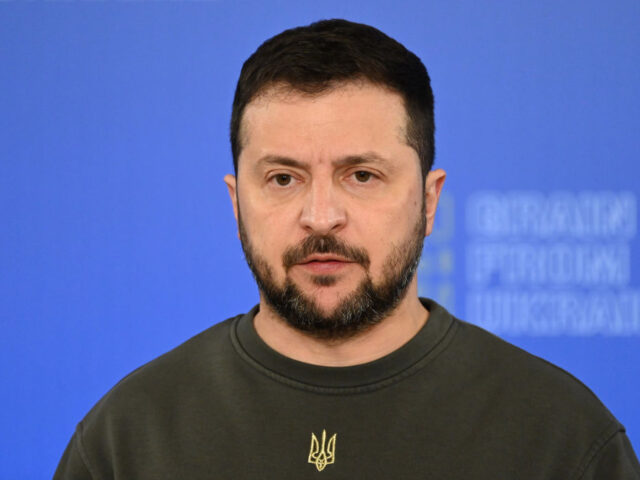While acknowledging that he shouldn’t “complain too much”, Volodymyr Zelensky has again expressed his displeasure with the volume of Western weapons flowing into his country.
There are not enough weapons in Ukraine and this has been a contributing factor to the failure of the so-called Spring Offensive, Ukrainian President Volodymyr Zelensky has said. Noting the lack of supplies and the war in Israel that has contributed to some of those supplies he hoped for not arriving, Zelensky, nevertheless told the Associated Press in an interview that he had a plan to overcome his nation’s supply problems.
Balancing his feelings on the supply situation, Zelensky told the wires service on one hand that it was good that Ukraine hadn’t crumpled in the face of the Russian invasion, remarking: “Look, we are not backing down, I am satisfied. We are fighting with the second (best) army in the world, I am satisfied”.
But Ukraine is “losing people”, he said, and this was down to the nation not getting “all the weapons we wanted, I can’t be satisfied, but I also can’t complain too much.”
Zelensky Tells Britain: ‘World Not Focussed’ on Ukraine Any More, ‘Divided’ by Middle East https://t.co/Nzs5lBfrSn pic.twitter.com/9GTZPlgMjc
— Breitbart London (@BreitbartLondon) November 16, 2023
Zelensky claimed that the lack of equipment from limited foreign supply impacted the effectiveness of the Spring Offensive, now basically considered a failure both in Ukrainian and Western circles.
“We wanted faster results. From that perspective, unfortunately, we did not achieve the desired results… There is not enough power to achieve the desired results faster. But this does not mean that we should give up, that we have to surrender”.
While Zelensky shrugged off direct questioning about the path U.S. politics should take in terms of support to Ukraine, he made it clear there were very real consequences for the West should his country fall to Moscow. Explaining Russia would take the collapse of his resistance due to a lack of Western interest as a green light to invade NATO’s eastern flank, Zelensky said: “And then the American children will fight”.
That a Threat? Zelensky Warns Ukrainians in Europe Could Act ‘Unpredictably’ if Western Aid Is Cuthttps://t.co/EAtH5PhNmo
— Breitbart London (@BreitbartLondon) September 13, 2023
This is not, by far, the first time Zelensky has made such dire warnings, that if Ukraine falls then an EU and NATO member state would be next. As reported in October, he rhetorically asked at a European leaders’ meeting whether those nations present could say for certain there were enough underground railways in their cities to relocate their children’s schools beyond the reach of drones and missiles, and if not, could they really afford to not underwrite Ukraine’s army.
“An aggressor is most effectively neutralized by defeat in war”, Zelensky said then, remarking: “None of you want to find out what it would be like if NATO had to defend one of you. We must win in Ukraine so that Putin cannot expand his aggression.”
With the coming of the war in Israel, the munition supply situation seems less certain than ever for Zelensky, a subject he has lamented. Nevertheless, the President has a plan to overcome this: increasing Ukrainian domestic production. The problem is that he needs yet more Western financial aid and support to make that dream a reality too.
He told the AP that he wanted Ukrainian arms factories to produce Western weapons, but to achieve this he needed licenses and loans. “This is the way out”, he said, explaining there was nothing Russia feared more than a Ukraine able to produce its own munitions. “Give us these opportunities, and we will build… Whatever effort and time it will take, we will do it, and we will do it very quickly” said Zelensky, asking for preferential credit terms to achieve it.
Zelensky Demands More Weapons, Saying Russia’s Air Force ‘Stopping’ Ukrainian Counteroffensivehttps://t.co/ZyitYbDqdf
— Breitbart London (@BreitbartLondon) September 10, 2023
More broadly, industrial production of new weapons is proving a major issue for NATO nations, which reaped the ‘peace dividend’ in the post Cold War-era by saving money on military procurement and stockpiling. In practice this meant closing armament factories and running down reserves, which has left NATO allies scrambling for limited supplies now they’re suddenly needed.
This scarcity has impacted both high and low technology. One of the most highly publicised shortages in Ukraine is of artillery shells, the design of which has not meaningfully changed for a century but which are now in severely short supply as Ukraine’s army fires what the few factories left in the West that still produce them can churn out.
The shortcomings are also being felt at the other end of the scale, with even a brand-new weapon system like the Anglo-Swedish ‘NLAW’ anti-tan missile suffering from severe supply chain issues. The British government revealed this year how after it was used to such spectacular effect earlier in the Ukraine war they tried to order more missles to replenish stocks, only to discover some of the companies that had produced components had already ceased trading.
Zelensky Hosts Major Arms Manufacturers Conference in Hopes to Boost Domestic Weapons Productionhttps://t.co/rqvsmcs4Z0
— Breitbart London (@BreitbartLondon) September 30, 2023

COMMENTS
Please let us know if you're having issues with commenting.